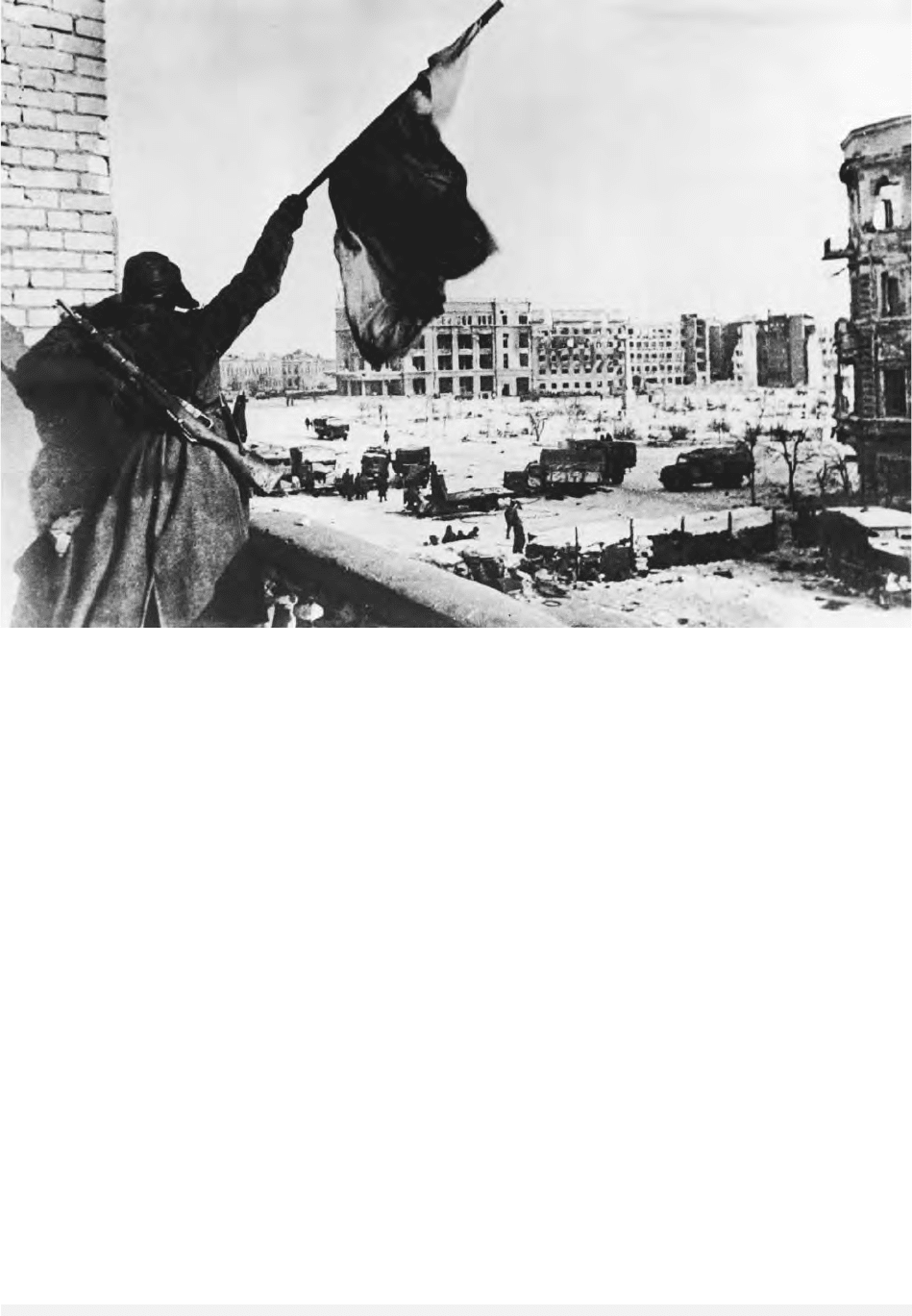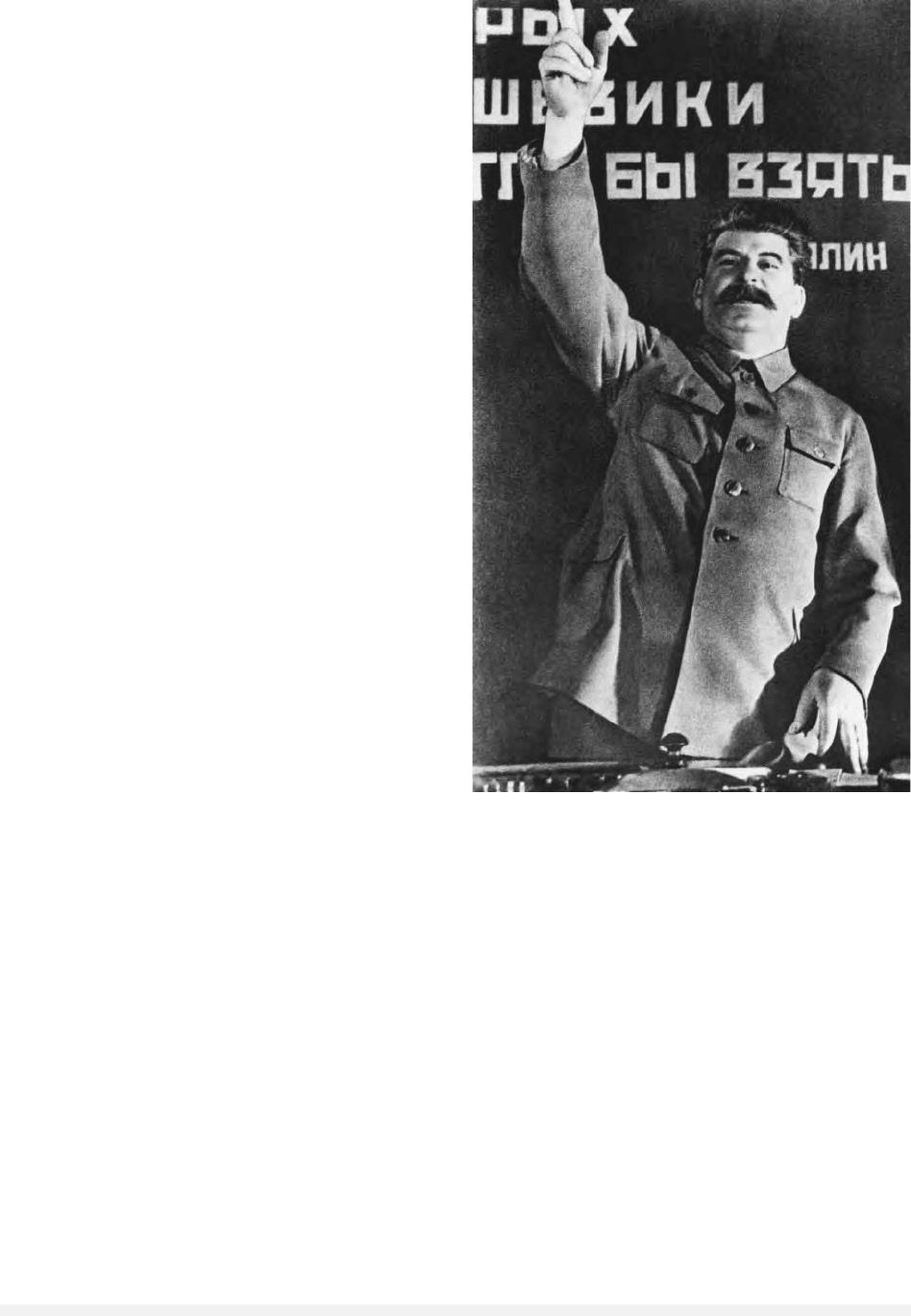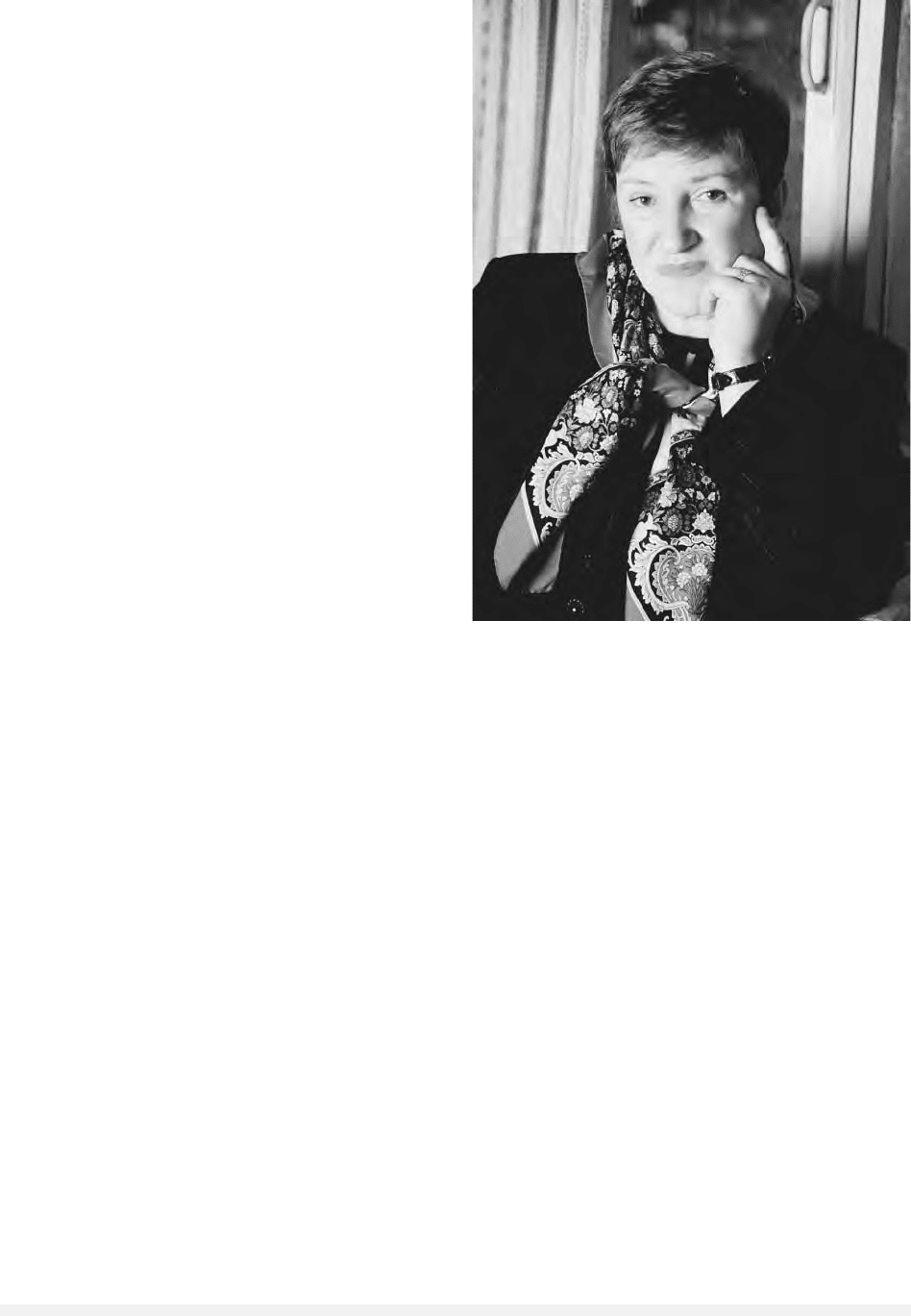Encyclopedia of Russian History
Подождите немного. Документ загружается.


days his feat was hailed by Pravda as a world
record. Anxious to celebrate and reward individu-
als’ achievements in production that could serve as
stimuli to other workers, the party launched the
Stakhanovite movement. The title of Stakhanovite,
conferred on workers and peasants who set pro-
duction records or otherwise demonstrated mas-
tery of their assigned tasks, quickly superseded that
of shockworker. Day by day throughout the au-
tumn of 1935, the campaign intensified, culmi-
nating in an All-Union Conference of Stakhanovites
in industry and transportation that met in the
Kremlin in November. At the conference, outstand-
ing Stakhanovites mounted the podium to recount
how, defying their quotas and often the skepticism
of their workmates and bosses, they applied new
techniques of production to achieve stupendous re-
sults for which they were rewarded with wages
that reached dizzying heights. Josef Stalin captured
the upbeat mood of the conference when, by way
of explaining how such records were only possible
in the land of socialism, he uttered the phrase, “Life
has become better, and happier too.” Widely dis-
seminated, and even set to song, Stalin’s words
served as the motto of the movement.
The Stakhanovite movement thus encom-
passed lessons not only about how to work, but
also about how to live. In addition to providing a
model for success on the shop floor, it conjured up
images of the good life. Many of the same quali-
ties Stakhanovites were supposed to exhibit in the
one sphere—cleanliness, neatness, preparedness,
and a keenness for learning—were applicable to the
other. These qualities were associated with kultur-
nost (culturedness), the acquisition of which marked
the individual as a New Soviet Man or Woman.
Advertisements for perfume, articles about Stak-
hanovites on shopping sprees, photographs of
Stakhanovites sharing their happiness with their
families, newsreels showing them driving new
automobiles—presented to them as gifts—and mov-
ing into comfortable apartments all symbolized kul-
turnost. Wives of male Stakhanovites had an
important part to play in the movement as help-
mates preparing nutritious meals, keeping their
apartments clean and comfortable, and otherwise
creating a cultured environment in the home so that
their husbands were well-rested and eager to work
with great energy. It was also important to demon-
strate that Stakhanovites were admired by their com-
rades and considered worthy of holding public office.
Notwithstanding the enormous publicity sur-
rounding Stakhanovites and their achievements,
they were not necessarily popular. Even before the
raising of output norms in early 1936, workers
who had not been favored with the best condi-
tions, and consequently struggled to fulfill their
norms, expressed resentment of Stakhanovites by
verbally and even physically abusing them. Fore-
men and engineers, only too well aware that
record mania and the provision of special condi-
tions for Stakhanovites created disruptions in
production and bottlenecks in supplies, also on oc-
casion sabotaged the movement. At least that was
the accusation made against many who often
served as scapegoats for the failure of the Stak-
hanovite movement to fulfill its promise of un-
leashing the productive forces of the country.
Nevertheless, the Stakhanovite movement contin-
ued into the war and even enjoyed something of
a revival in the postwar years, when it was ex-
ported to Eastern Europe.
See also: INDUSTRIALIZATION, SOVIET; KULTURNOST; SO-
VIET MAN
BIBLIOGRAPHY
Siegelbaum, Lewis H. (1988). Stakhanovism and the Pol-
itics of Productivity in the USSR, 1935–1941. New
York: Cambridge University Press.
Thurston, Robert. (1993). “The Stakhanovite Movement:
The Background to the Great Terror in the Factories,
1935–1938.” In Stalinist Terror: New Perspectives, eds.
J. Arch Getty and Roberta T. Manning. New York:
Cambridge University Press.
L
EWIS
H. S
IEGELBAUM
STALIN CONSTITUTION See CONSTITUTION OF
1936.
STALINGRAD, BATTLE OF
The Battle of Stalingrad (July 17, 1942–February 2,
1943) was the most significant Red Army victory
during World War II. It included the Red Army’s
defense against Operation “Blau” (Blue), the Ger-
man Army’s summer 1942 advance to Stalingrad,
and offensive operations in the fall of 1942 and
winter of 1943 to defeat German and other Axis
forces in the Stalingrad region.
The defensive phase of the battle began on July
17, after German Army Groups “A” and “B”
smashed the defenses of the Red Army’s Briansk,
STALINGRAD, BATTLE OF
1453
ENCYCLOPEDIA OF RUSSIAN HISTORY

Southwestern, and Southern Fronts in southern
Russia and advanced to the Don River west of
Stalingrad. Initially, the newly formed Stalingrad
Front, commanded by marshal of the Soviet Union
S. K. Timoshenko, defended the Stalingrad region
with the 21st, 62d, 63d, 64th, and 57th Armies,
the 1st and 4th Tank Armies, and the 8th Air Army,
which opposed the 6th Army and 4th Panzer Army
of Army Group “B.” After overwhelming the 62nd
and 64th Army’s defenses west of the Don River in
late July and defeating a major counterstroke by
the 1st and 4th Tank Armies, in late August Gen-
eral Friedrich Paulus’s Sixth Army broke through
Soviet defenses along the Don River and reached the
Volga River north of Stalingrad, while General Her-
mann Hoth’s Fourth Panzer Army reached the city’s
southwestern suburbs. The twin blows isolated the
Soviet 62d and 64th Armies in Stalingrad and ini-
tiated two months of vicious and costly fighting
for possession of the city. The fighting consumed
the bulk of German forces and forced them to de-
ploy weak Italian and Rumanian armies along their
overextended flanks north and south of the city.
While Stalin fed enough forces into Stalingrad to
tie German forces down, the Stavka planned a
counteroffensive, Operation “Uranus,” orchestrated
by General A. M. Vasilevsky, to encircle and de-
stroy Axis forces at Stalingrad.
The offensive phase of the battle commenced
on November 19, 1942, when the forces of General
N. F. Vatutin’s and A. I. Eremenko’s Southwestern
and Stalingrad Fronts pierced Axis defenses north
and south of the city and joined west of Stalingrad
on November 23, encircling more than 300,000
German and Rumanian forces in the city. Offen-
sives by the Southwestern and Stalingrad Fronts
along the Chir, Don, and Aksai Rivers in December
destroyed the Italian 8th Army and frustrated two
German attempts to rescue their forces besieged
in Stalingrad. On February 2, 1943, after Bryansk,
Voronezh, Southwestern, and Southern (former
Stalingrad) Front forces attacked westward from
the Don River and toward Rostov, General K. K.
STALINGRAD, BATTLE OF
1454
ENCYCLOPEDIA OF RUSSIAN HISTORY
A Red Army soldier waves a flag while trucks gather in the square below during the Battle of Stalingrad. © H
ULTON
A
RCHIVE

Rokossovsky’s Don Front defeated and captured
Paulus’s 6th Army and almost 100,000 men.
At a cost of more than one million casualties,
including almost 500,000 dead, missing, or cap-
tured, during the battle the Red Army destroyed or
badly damaged five Axis armies, including two
German, totaling more than fifty divisions, and
killed or captured more than 600,000 Axis troops.
The unprecedented German defeat was a turning
point indicative of eventual Red Army victory in
the war.
See also: WORLD WAR II
BIBLIOGRAPHY
Beevor, Antony. (1998). Stalingrad: The Fateful Siege,
1941–1943. New York: Viking
Erickson, John. (1975). The Road to Stalingrad. New
York: Harper & Row.
Glantz, David M. (1995). When Titans Clashed: How the
Red Army Stopped Hitler. Lawrence: University Press
of Kansas.
D
AVID
M. G
LANTZ
STALIN, JOSEF VISSARIONOVICH
(1879–1953), general secretary of the Communist
Party, Soviet dictator.
Josef Vissarionovich Dzhugashvili, who in rev-
olutionary work was called Koba before adopting
the nom de plume Stalin, was born in Gori, Geor-
gia, to a working-class family; his father was a
cobbler and his mother a domestic servant. Many
of the details of his early life remain in dispute, but
his education was gained at a local church school
and the Tiflis (Tbilisi in Georgian) Orthodox semi-
nary, from which he was expelled in 1899. He
joined the Russian Social Democratic Labor Party
soon after its foundation, and in 1901 was elected
to the Tiflis Social Democratic Committee. Follow-
ing the split in the party in 1903, Stalin became a
Bolshevik. For the following decade and a half, he
was involved in a variety of revolutionary activi-
ties, including the publication of illegal materials,
organizational work among workers and within
the party, and bank raids to garner funds to sus-
tain party work. He met Vladimir Lenin in 1905,
and briefly traveled abroad on party business to
Stockholm, London, Kracow, and Vienna. In 1912
he was elected in his absence onto the party Cen-
tral Committee and became an editor of the party
newspaper, Pravda. In 1913 he wrote his most im-
portant early work, Marxism and the National Ques-
tion. His revolutionary work was interrupted by
arrest in 1902, 1909, 1912, and 1913; he escaped
from the first three bouts of exile and returned to
Petrograd from the last one when the tsar fell in
February 1917. In 1903 he married his first wife,
Yekaterina Svanidze, his son Yakov was born in
1904, and his wife died of tuberculosis in 1907.
When Stalin returned to Petrograd soon after
the tsar’s fall, he was one of the leading Bolsheviks
in the city. He was elected to the newly established
Russian bureau of the party and to the editorial
board of Pravda. Along with Vyacheslav Molotov
and Lev Kamenev, he championed the policy of sup-
port for the Provisional Government and a defen-
sist position on the war, until Vladimir Lenin
returned in April and overturned these in favor of
a more revolutionary stance. Stalin went along
with Lenin’s views. During the revolutionary pe-
riod, Stalin seems to have spent most of his time
on organizational work. He was not a stirring
speaker like Trotsky or someone with the presence
of Lenin, and therefore after the return of Lenin and
the emigrés, he was not seen as one of the leading
lights of the party. Nevertheless, following the
seizure of power in October, Stalin became people’s
commissar for nationalities, a position that from
April 1919 he held jointly with the post of people’s
commissar of state control (from February 1920,
the Workers’ and Peasants’ Inspectorate). The lat-
ter post was concerned with the elimination of
corruption and inefficiency in the central state ma-
chine. During the civil war, Stalin was active on a
series of military fronts, and it was at this time
that his first major clash with Leon Trotsky oc-
curred. More importantly, when the Politburo,
Orgburo, and Secretariat of the Central Committee
were established in March 1919, Stalin became a
member of all three. He was the only member si-
multaneously of these bodies and the CC, and was
therefore in a place of significant organizational
power. In April 1922 he was elected general secre-
tary of the party, and therefore the formal head of
the party’s organizational machine. With Lenin’s
illness from May 1922 and his death in January
1924, Stalin was able to make use of this power
to consolidate his control at the top of the party
structure.
Lenin’s death was followed by intensified fac-
tional conflict among his would-be successors.
STALIN, JOSEF VISSARIONOVICH
1455
ENCYCLOPEDIA OF RUSSIAN HISTORY

Between 1923 and 1929, Stalin and his supporters
successively outmaneuvered Trotsky and his sup-
porters, the Left Opposition, the United Opposition,
and the Right Opposition, so that by the end of the
decade, Stalin was primus inter pares. Stalin’s suc-
cess in these factional conflicts has usually been
attributed to the organizational powers stemming
from his ability to use the machinery of the party
to promote his supporters and exclude the sup-
porters of his opponents. This was clearly a signif-
icant factor in his ability to outflank his opponents
at party meetings and use those symbolically to de-
feat them through a party vote. Stalin was the
source of jobs, and therefore someone who was at-
tractive to many with ambitions in Soviet politics.
But Stalin was also a person who espoused the sorts
of policies that would have appealed to many rank-
and-file Bolsheviks: The ability of the USSR to build
socialism in one country rather than having to wait
for international revolution and the need to shift
from the gradualist framework of NEP into a more
revolutionary attempt to build socialism, were two
of the most important of such policies. Thus
through a combination of the weaknesses of his
opponents, the strength of his organizational
power, and the attractiveness of many of the po-
sitions he espoused, Stalin was able to triumph over
his more fancied rivals for leadership; he was even
able to overcome the negative evaluation of him in
Lenin’s so-called Testament.
Stalin’s defeat of his more prominent rivals did
not mean that he was secure in the leadership of
the party in the early 1930s. At the end of 1927,
at Stalin’s behest the party adopted the first of a
series of decisions that led to the abandonment of
the moderation of the New Economic Policy and its
replacement by an increasingly rapid pace of in-
dustrialization and agricultural collectivization.
This produced continuing strains within the party,
even when the most prominent opponents of this
new course—the Right Opposition led by Nikolai
Bukharin, Alexei Rykov, and Mikhail Tomsky—
had been defeated in 1929. In late 1930 the Syrtsov-
Lominadze group and in 1932 the Ryutin Platform
were two important instances of high-ranking
party members criticizing the course of economic
policy, with the latter even calling for Stalin’s re-
moval. For many within the party’s leading ranks,
the gamble on forced pace industrialization and
agricultural collectivization, while justifiable in
terms of the achievement of the ultimate goal of a
socialist society, was in practice proving to be more
costly and disruptive than they had been led to be-
lieve. The reports of widespread popular opposition
to collectivization raised the specter of the increased
isolation of the party within the society; the trials
of so-called saboteurs in 1930 and 1931 only in-
creased this sense. They were not reassured by the
increasing glorification of Stalin personally that be-
gan on his fiftieth birthday in December 1929. The
cult of Stalin that thus emerged was clearly an at-
tempt to shift the basis of political legitimacy away
from the party and onto the person of Stalin.
At this time of political uncertainty, in No-
vember 1932 Stalin’s second wife, Nadezhda
Allilueva who he had married in 1919, died. At the
time it was announced that she had died of a heart
attack, but it was widely believed that she had shot
herself. There have also been rumors that Stalin
himself killed her, but the truth is still not known.
In 1933 a party purge, or chistka, was an-
nounced. This was to be a bloodless affair involv-
ing a check on the performance of all party
members and the expulsion of those whose per-
STALIN, JOSEF VISSARIONOVICH
1456
ENCYCLOPEDIA OF RUSSIAN HISTORY
Josef Stalin in January 1946. A
SSOCIATED
P
RESS
. R
EPRODUCED BY
PERMISSION
.

formance was found to be deficient. This was fol-
lowed by similar campaigns in 1935 and 1936.
Against this background of suspicion of the true
beliefs and commitment of some party members,
the seventeenth congress of the party was held in
January–February 1934. This congress, the so-called
Congress of Victors, announced the successful
completion of collectivization, and although there
was a significant level of public glorification of
Stalin, there was also evidence of some high-level
dissatisfaction with him. In December of that year,
Leningrad party boss and close associate of Stalin,
Sergei Kirov, was assassinated. Kirov’s death was
used as an excuse to crack down on various elements
including so-called Trotskyites and Zinovievites.
In January 1935, Kamenev, Grigory Zinoviev, and
seventeen other members of a reputed “center” were
tried and convicted of moral and political respon-
sibility for the death of Kirov, and were sentenced
to imprisonment. This wave of purging tapered off
by the middle of 1935. However, it surged once
again in 1936, paradoxically at the time of the
discussion of the new Stalin state Constitution
adopted in December 1936, lasting unabated until
the end of 1938. The so-called Great Terror, sym-
bolized by the show trials of Old Bolsheviks in
August 1936, January 1937, and March 1938, de-
stroyed all semblance of opposition to Stalin and
left him supreme at the apex of the party. He was
now the unchallenged leader of the country, the
vozhd, untrammelled by considerations of collec-
tive leadership, the absolute arbiter of the futures
of all of those who worked with him in the lead-
ership and in the country as a whole.
The personal primacy of Stalin, symbolically
celebrated in a new peak of adulation at the time
of his sixtieth birthday, occurred at a time of in-
creasing international tension. In August 1939 the
Soviet-German Non-Aggression Pact was signed,
an agreement that Stalin had actively sought. The
results of that pact were played out in the follow-
ing two years, with Soviet territorial gains on its
western border. In May 1941 Stalin became chair-
man of the Council of People’s Commissars, or
prime minister, to add to his position as General
secretary. The following month, Germany attacked
the Soviet Union, ushering in a new phase in
Stalin’s leadership, that of the war leader.
From the time of the attack, Stalin was closely
involved in organizing the defense of the Soviet
Union. The long public delay in any announcement
from him following the opening of hostilities led
many to claim that Stalin, who had seemingly ig-
nored all warnings about the likelihood of German
attack, had been mentally paralyzed by the attack
and took no part in the initial Soviet response.
However, it has now become clear that Stalin was
busy in meetings during this time, participating as
he did right through the war in the resolution of
issues not just of civil government but of military
strategy and tactics. Throughout the conflict, Stalin
was closely involved in a practical capacity in di-
recting the Soviet war effort. He was also important
symbolically. By mobilizing Russian nationalism
and presenting himself as its personification, Stalin
became the ultimate symbol of both the Soviet pop-
ulace and its armed forces. His refusal to leave
STALIN, JOSEF VISSARIONOVICH
1457
ENCYCLOPEDIA OF RUSSIAN HISTORY
Josef Stalin attends a meeting commemorating the completion
of the first segment of the Moscow subway system in 1935.
© H
ULTON
-D
EUTSCH
C
OLLECTION
/CORBIS

Moscow, even when German troops were at its
gates, reinforced this image. It is probable that the
war ushered in the highest point of Stalin’s real, as
opposed to cult-presented, popularity. Stalin be-
came known as the Generalissimo.
With the end of the war, the Soviet Union was
clearly one of the leading powers remaining and
Stalin was an international figure, as symbolized
by his presence at the conferences with the British
and U.S. leaders in Tehran, Yalta, and Potsdam.
He ruled over not only the Soviet Union, but also
the newly established socialist states in Eastern Eu-
rope. At home, there was a return to orthodoxy as
controls were tightened once again following the
relaxation of the wartime period. Stalin’s personal
control remained undiminished. The leadership
functioned as Stalin demanded; formal party or-
gans were largely replaced by loose groupings of
individual leaders summoned at Stalin’s whim and
carrying out whatever tasks he accorded to them.
Always a suspicious man, Stalin’s sense of para-
noia seems to have grown in the post-war period,
something fueled by the Cold War. Although there
were no purges on the scale of the 1930s, the more
limited use of coercion and terror occurred in the
Leningrad affair of 1949–1950, the Mingrelian case
of 1951–1952, and the Doctors’ Plot of 1952–1953.
As in the 1930s, such purging occurred against a
backdrop of the apogee of the Stalin cult at the time
of his seventieth birthday in 1949. In this period,
Stalin was probably more detached from the daily
process of political life than he had ever been. But
this does not mean that he was any less power-
ful; he still set the tenor of political life, and he
was in a position to be able to decide any issue he
wished to decide, which is the true measure of a
dictator. His colleagues, really subordinates, may
have maneuvered among themselves for increased
power and for particular policy positions, but none
challenged his primacy. Stalin died on March 5,
1953, probably of natural causes; some have ar-
gued that some of his leadership colleagues may
have poisoned him, but there has been no evidence
to sustain this accusation.
Both of Stalin’s wives died at an early age, and
he seems to have had difficult relations with his
children. From his second marriage he had a son,
Vasily (b. 1921) and a daughter Svetlana (b. 1926),
both of whom outlived him. Stalin seems to have
had little personal contact with either of these chil-
dren or with Yakov, his son by his first marriage.
Vasily joined the air force during the war and
through his father’s patronage quickly rose to a
leadership position. He subsequently became an al-
coholic. Yakov was in the army and was captured
by the Germans; reports suggest that Stalin refused
a prisoner swap that would have returned Yakov
to him. After Stalin’s death, Svetlana married a cit-
izen of India, and when he died in 1966 she took
his body to India and decided to remain abroad, re-
turning briefly in 1984.
Stalin was the longest-serving leader of the So-
viet Union and clearly left a major imprint on its
development. He has been described as cruel, secre-
tive, manipulative, opportunistic, doctrinaire, para-
noid, devoid of human feelings and sentiment,
single-minded, and power-hungry. All of these de-
scriptions can find sustenance in different aspects
of Stalin’s biography. Where the balance lies re-
mains a matter of debate. What is clear is that when
he believed it was required, he could be ruthless in
the actions he took against both enemies and sup-
posed friends. In this sense, he was a man of ac-
tion. He was not an intellectual, despite the claims
of the cult. His literary output was moderate in
size and generally both turgid in prose and me-
chanical in its arguments, but it did gain the sta-
tus of orthodoxy within the USSR, a function of
his political dominance rather than the intrinsic
merit of his work.
Stalin’s life remains the subject of debate. Many
aspects are still highly controversial, with scholars
disagreeing widely on them. The following are
among the most important of these.
Why was Stalin victorious? This question has
often been posed in a broader form: Why did the
Stalinist system emerge in the Soviet Union, the
first attempt to create a socialist society on a na-
tional scale? Debate on this question has been vig-
orous precisely because of the implications its
answer was seen to have for socialist aspirations
more generally. Many, particularly on the right of
the political spectrum, argued that such a system
was a logical, even inevitable, result of revolution
and the sort of system that Lenin set in place. Oth-
ers argued that, while the Leninist system may
have made a highly coercive, undemocratic system
more likely, this was neither the necessary nor in-
evitable outcome of either the revolution or Lenin-
ism. Many argued the primacy of organizational
factors, especially the power Stalin was able to gain
and exercise within the party apparatus. Others
emphasized the importance of Stalin’s personality,
skills, and talents, especially in contrast to those of
STALIN, JOSEF VISSARIONOVICH
1458
ENCYCLOPEDIA OF RUSSIAN HISTORY

his opponents. Another strand of argument focused
upon the regime’s desire to bring about substan-
tial socioeconomic change in an economically and
politically backward society, a situation requiring
a high level of centralization and coercion. Others
noted the role of the party’s isolation in Soviet so-
ciety and the nature of the recruits flowing into its
ranks. This question remains unresolved, but an
answer, most now agree, involves elements of all
of the arguments noted above.
Was Stalin responsible for Kirov’s assassina-
tion? Those supporting the view that Stalin was re-
sponsible argue that Kirov was seen as a possible
challenge to or replacement for Stalin, and accord-
ingly Stalin had him assassinated. Other suggestions
have been that Kirov’s killer was indeed working
for a bloc of oppositionists as Stalin and his sup-
porters claimed, that he was working alone, or that
it was the security apparatus who had planned a
failed assassination attempt to boost their institu-
tional stocks but that this went wrong. Despite re-
search in the archives, no definitive answer has been
forthcoming, and all cases remain circumstantial.
There is now no doubt about Stalin’s respon-
sibility for the terror. This was not a normal party
purge that went off the rails. Given Stalin’s posi-
tion in the party organization and the position oc-
cupied by his supporters, this could not have gone
ahead without his permission. He probably did not
have an exact idea of how many people suffered
during the terror, but he must have had an idea of
the general dimensions, and he certainly knew of
some of the individuals who perished, because he
signed lists of victims submitted to him. Ultimately
Stalin was responsible, even if the primary role in
the direction of it lay with his henchmen.
Was Stalin planning another major purge when
he died? Those who argue in favor of this point to
the buildup of pressure through the Leningrad af-
fair, the Mingrelian case, and the Doctors’ Plot, and
the enlargement of the party Presidium at the nine-
teenth congress of the party in October 1952. This
was seen as preparatory to purging some of the
older established leaders and bringing newer ones
forward. Many of those who accept this logic also
accept that Stalin was poisoned. There is no firm
evidence about Stalin’s intentions either way, and
unless compelling evidence comes from the archives,
this will remain a moot point.
Finally there is the question of the costs and
benefits of Stalin and his regime. Under his rule,
the Soviet Union moved from being a backward,
predominantly agricultural country to one of the
two superpowers on the globe. The living standards
of many of its people rose significantly, as did lit-
eracy and education levels. Urbanization trans-
formed the landscape. And the Soviet Union won
the war against Hitler, something that would have
been highly unlikely without high-level industrial-
ization. But critics point to the costs: millions killed
as a result of famine, terror, and collectivization;
the massive wastage of resources; the establish-
ment of an economic system that ultimately could
not sustain itself; the development of a society
which crushed individual initiative and free think-
ing. This was an ambiguous legacy, and one that
therefore was difficult for the regime to handle. Un-
der Khrushchev, destalinization was a limited pol-
icy that refused to come to grips with the reality
of the Stalin regime. When discussion was again
permitted, under Mikhail Gorbachev, the political
circumstances of the time prevented a balanced
evaluation from emerging. Russia still must broach
this question, but it is likely that this will only hap-
pen in a satisfactory way when the Stalin issue is
not seen to have contemporary political relevance.
That may be some time off.
See also: COLD WAR; COLLECTIVIZATION OF AGRICUL-
TURE; CULT OF PERSONALITY; DE-STALINIZATION;
ECONOMIC GROWTH, SOVIET; INDUSTRIALIZATION,
SOVIET; KIROV, SERGEI MIRONOVICH; NAZI-SOVIET
PACT OF 1939; PURGES, THE GREAT; SHOW TRIALS;
STATE SECURITY, ORGANS OF; WORLD WAR II
BIBLIOGRAPHY
Gill, Graeme. (1990). The Origins of the Stalinist Political
System. Cambridge, UK: Cambridge University Press.
Hingley, Ronald. (1974). Joseph Stalin: Man and Legend.
New York: McGraw-Hill.
Tucker, Robert C. (1973). Stalin as Revolutionary
1879–1929: A Study in History and Personality. Lon-
don: Chatto & Windus.
Tucker, Robert C. (1990). Stalin in Power: The Revolution
from Above, 1928–41. New York: Norton.
Ulam, Adam B. (1989). Stalin: The Man and His Era.
Boston: Beacon.
Volkogonov, Dmitri. (1991): Stalin: Triumph and Tragedy.
New York: Grove.
G
RAEME
G
ILL
STALIN REVOLUTION See INDUSTRIALIZATION,
SOVIET.
STALIN REVOLUTION
1459
ENCYCLOPEDIA OF RUSSIAN HISTORY

STANISLAVSKY, KONSTANTIN
SERGEYEVICH
(1863–1938), actor, director, acting teacher.
The first creator of a comprehensive guide to ac-
tor training, Stanislavsky emerged as one of the most
influential theater personalities of the twentieth
century. His work continues to shape theatrical dis-
course into the twenty-first century.
Born Konstantin Sergeyevich Alexeyev to the
wealthy Alexeyevs, he first performed in a fully
equipped home theater outside Moscow. Because of
his social class, he limited his theatrical ambitions
to the amateur sphere. In 1888 he founded The
Society of Art and Literature, a critically acclaimed
theater club, where he established himself as an out-
standing actor and emerging director. As his talents
became known, he adopted “Stanislavsky” (1884)
to protect his family name. In 1897 Vladimir Ne-
mirovich-Danchenko, playwright and head of the
only acting school in Moscow, invited Stanislavsky
to cofound The Moscow Art Theater (MAT) as a
professional venture. The two agreed to produce
plays of contemporary import, bring European
stage realism to Russia, and ensure that the work
of directors, designers, and actors would embrace
unified dramatic visions. The theater opened with
an historically researched production of Alexei
Tolstoy’s Tsar Fyodor Ioannovich (1898). Anton Che-
khov’s The Seagull (1898) secured the company’s
fame. Stanislavsky directed and acted in productions
such as premieres of Chekhov’s plays (1898–1904),
Henrick Ibsen’s An Enemy of the People (1902), and
Maxim Gorky’s The Lower Depths (1902).
In 1906 Stanislavsky lost inspiration as an ac-
tor and retreated to Finland in despair. The crisis
induced his passionate desire to systematize acting.
He devoted the rest of his life to collecting, devel-
oping, and teaching ways to control inspiration.
His “System” went through continuous evolution
incorporating the experience of great actors, be-
haviorist psychology, yoga, and other sources that
illuminate the creative process. Stanislavsky’s ex-
perimental stance caused friction, which ignited in
1909 when he applied his ideas to Ivan Turgenev’s
A Month in the Country. Nemirovich’s hostility
prompted Stanislavsky to transfer his experiments
into a series of studios, adjunct to the main com-
pany, even as he continued to act and direct at
MAT. The First Studio, founded in 1911, became
his most famous laboratory, because it laid the Sys-
tem’s foundation.
With the Bolshevik revolution, Stanislavsky
and MAT were reduced to poverty. From 1922 to
1924, Stanislavsky toured Europe and the United
States with the company’s earliest and most fa-
mous productions in an effort to recoup financial
stability. During this period, he also began to write,
publishing My Life in Art in 1924. This period guar-
anteed his international influence.
Upon returning to Moscow, Stanislavsky faced
growing Soviet control over the arts. His connec-
tions with the West and his production of Mikhail
Bulgakov’s play about White Russians, The Days of
the Turbins (1926), came under attack. From 1934
to 1938, during the Soviet purges, Stanislavsky
was weakened by an enlarged heart and confined
to his home. Stalin simultaneously canonized the
director’s realistic work as the vanguard of Social-
ist Realism. Isolated from the wider world, Stanislav-
sky continued to write, teach, and develop his ideas
in his home until his death in 1938 of a heart at-
tack.
See also: BULGAKOV, MIKHAIL AFANASIEVICH; CHEKHOV,
ANTON PAVLOVICH; MOSCOW ART THEATER; SOCIAL-
IST REALISM; THEATER
BIBLIOGRAPHY
Benedetti, Jean. (1990). Stanislavski: A Biography. New
York: Routledge.
Carnicke, Sharon Marie. (1998). Stanislavsky in Focus.
London: Harwood/Routledge.
Smeliansky, Anatoly. (1991). “The Last Decade:
Stanislavsky and Stalinism.” Theatre 12(2):7–13.
S
HARON
M
ARIE
C
ARNICKE
STARCHESTVO See SPIRITUAL ELDERS.
STAROVOITOVA, GALINA VASILIEVNA
(1946–1998), martyred political figure and human
rights activist.
Galina Starovoitova was one of Russia’s lead-
ing human rights advocates and served in the first
post-Soviet Russian government. Murdered by un-
known assailants on November 20, 1998, in St. Pe-
tersburg, she was eulogized as “a symbol of
courage and outspokenness,” “one of the brightest
lights of Russian independence and reform move-
STANISLAVSKY, KONSTANTIN SERGEYEVICH
1460
ENCYCLOPEDIA OF RUSSIAN HISTORY

ment,” and a leader with an “uncompromising ded-
ication to democracy.”
Starovoitova was born in Chelyabinsk, earned
B.A. and M.A. degrees in social psychology, and in
1980 received a Ph.D. from the Institute of Ethnog-
raphy, USSR Academy of Sciences. She worked as
an ethnographer and psychologist, and published
scientific works in both fields, with a specializa-
tion in inter-ethnic relations and cross-cultural
studies.
Her political activities began in the late 1980s
with the Moscow Helsinki Group, a human rights
organization led by Andrei Sakharov and other
prominent dissident leaders. She joined with
Sakharov to campaign for the rights of Armenians
in the enclave of Nagorno-Karabakh, and in 1989,
in appreciation, was elected to the USSR Congress
of Peoples’ Deputies from Yerevan, the capital of
Armenia. The Congress elected her to serve in the
Supreme Soviet, where she became one of the co-
founders of the pro-reform Inter-Regional Group
of Deputies. A year later, she was elected to the
Russian parliament from a constituency in St. Pe-
tersburg and became a co-chair of the Democratic
Russia Party.
After the USSR collapsed, Starovoitova became
an adviser to President Boris Yeltsin on inter-
ethnic affairs, but she resigned in 1992 because of
disagreements over policy in the Caucasus region
and frustration with a government still beholden
to elements of the old Soviet system. From 1993
to 1994 she was a fellow at the U.S. Institute of
Peace in Washington, D.C., and the following year
she taught at Brown University.
In 1995 Starovoitova was elected to the Rus-
sian Duma, where she became a prominent spokes-
woman on human rights, the war in Chechnya,
the environment, women’s rights, wage issues,
housing, antisemitism, and religious freedom. In
1996, she ran for the presidency, the first Russian
woman to do so. She talked of running again in
2000, and before her death announced that she
would run for governor of Leningrad oblast. Sta-
rovoitova saw Russia’s communists and national-
ists as standing in the way of democratization, and
they in turn were her main opponents. Shortly be-
fore her death, she spoke out forcefully about po-
litical corruption, and many speculate that her
investigations in this area precipitated her murder.
Millions of Russians mourned Galina Starovoi-
tova’s death, and a kilometer-long line of people
waited in the cold to pay their respects. The inves-
tigation of her murder was turned over to the high-
est authorities, but despite the interrogation of
hundreds of witnesses, the detention of hundreds
of suspects, and pledges to catch those guilty of the
crime, no one was charged. Several Russians view
the murder as a political assassination perpetrated
either by organized crime or corrupt political offi-
cials.
See also: ORGANIZED CRIME; SAKHAROV, ANDREI
DMITRIEVICH
BIBLIOGRAPHY
Diuk, Nadia. (1999). “Galina Starovoitova.” Journal of
Democracy 10:188–190.
Powell, B. (1998). “Requiem for Reform.” Newsweek.
December 7, 1998, p. 38.
P
AUL
J. K
UBICEK
START See STRATEGIC ARMS REDUCTION TALKS.
START
1461
ENCYCLOPEDIA OF RUSSIAN HISTORY
Democratic activist Galina Starovoitova was murdered outside
her apartment in St. Petersburg. © ANTONOV/RPG/CORBIS SYGMA

STASOVA, YELENA DMITRIEVNA
(1873–1966), Bolshevik, secretary of the Central
Committee of the Russian Communist Party,
1919–1920.
Yelena Stasova belonged to a prominent St. Pe-
tersburg intelligentsia family. In the early 1900s
she became a secretary of the illegal St. Petersburg
committee of the Russian Social-Democratic Labor
Party. Stasova was an effective administrator and
conspirator, as well as a staunch supporter of
Vladimir Lenin. Arrested in 1907, she spent the
next ten years in exile, first in the Caucasus and
then in Siberia.
After the revolution, in 1917 and 1918, Stasova
was a secretary of the Petrograd party committee.
She chose to concentrate on the mundane but cru-
cially important work of administration, keeping
records, dispersing funds, and handing out job as-
signments. In 1919, when Central Committee Sec-
retary Yakov Sverdlov died, Lenin tapped Stasova to
replace him. She struggled to improve the organi-
zation of the party’s central administration, but her
efforts did not dispel charges of chronic inefficiency
in the Secretariat. In 1920, Lenin responded by re-
placing Stasova with three male secretaries. She left
the party leadership having played an important
part in building the Communist Party’s apparatus.
For the rest of her long life Stasova took in-
significant assignments. In the 1930s she headed
the International Organization for Aid to Revolu-
tionaries. Her obscurity probably helped her sur-
vive the party purges and aid some of its victims.
In the 1950s and 1960s she published several ver-
sions of her memoirs, all dedicated to restoring the
reputation of the party’s founders. Stasova died of
natural causes.
See also: COMMUNIST PARTY OF THE SOVIET UNION; FEM-
INISM
BIBLIOGRAPHY
Clements, Barbara Evans. (1997). Bolshevik Women. Cam-
bridge, UK: Cambridge University Press.
B
ARBARA
E
VANS
C
LEMENTS
STASOV, VLADIMIR VASILIEVICH
(1824–1906), music and art critic whose aesthet-
ics of realist and national expression in the arts
served as a model for socialist realism.
Born into a prominent upper-class family (his
father was a noted architect), Vladimir Stasov grad-
uated in 1843 from the elite St. Petersburg School
of Jurisprudence and also studied piano. After a pe-
riod in various undistinguished civil service jobs, he
was appointed secretary to Prince Antaoly N. Demi-
dov in 1851 and spent almost three years in the
West, mostly in Florence. Back in Russia he found
employment in the Imperial Public Library in the
capital, and from 1872 until his death he headed
its arts department.
Stasov’s voluminous writings consist of polem-
ical feuilletons, monographs on individual musicians
and painters, and long overviews of developments
in the arts (both in Russia and the West), as well as
on Russian architecture and archeology. Inspired by
the radical literary critic Vissarion Belinsky, Stasov
promoted realist and national artistic forms that
would engage the public in current social and his-
torical issues. His original, liberal, and open-minded
stance in opposition to the regnant academicism in-
vigorated the cultural scene. But by the 1890s his
aesthetics had turned conservative and chauvinistic,
condemning as decadent the new artistic trends that
were challenging national realism, which had by
then become a new form of academicism.
With the publication of his monograph on
Mikhail Glinka in 1847, which stressed the com-
poser’s originality in using folk motifs, Stasov be-
gan to advocate Russianness in music. Thereafter he
consistently championed young, independent com-
posers—Miliy A. Balakirev, Alexander P. Borodin,
César A. Cui, Modest P. Musorgsky, and Nikolai A.
Rimsky-Korsakov—whom he jointly called “The
Mighty Five” (moguchaya kuchka). They all were
self-taught, opposed the hidebound rules of the con-
servatory, and strove to create, in Glinka’s foot-
steps, a distinctly Russian school of music. Stasov
supported these composers with polemical publica-
tions and contributed significantly to their creative
work, suggesting topics, supplying historical doc-
umentation, and commenting on compositions. He
was especially close to Musorgsky, whose genius
he was the first to recognize.
In the 1860s Stasov began to comment regu-
larly on the situation in the pictorial arts, ques-
tioning the authority of the Imperial Academy of
Arts with its Italianate tastes. Instead, he advocated
art that depicted Russian subjects in a manner that
would instruct the public about the country’s re-
alities. He became closely associated with young
painters who in 1863 had quit the academy in
protest against its outdated routines and in 1871
STASOVA, YELENA DMITRIEVNA
1462
ENCYCLOPEDIA OF RUSSIAN HISTORY
